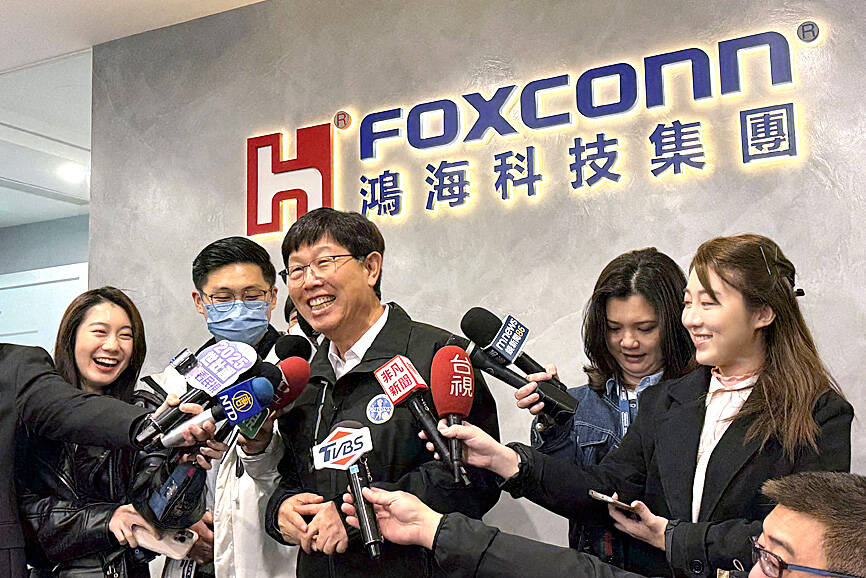Hon Hai Precision Industry Co (鴻海精密), the world’s largest contract electronics maker, posted its highest-ever first-quarter revenue on strong demand for artificial intelligence (AI) products, but said it would need to closely watch global politics.
Revenue for Apple Inc’s biggest iPhone assembler jumped 24.2 percent year-on-year to NT$1.64 trillion (US$49.5 billion), Hon Hai said in a statement on Saturday, just missing the NT$1.68 trillion LSEG SmartEstimate, which gives greater weight to forecasts from analysts who are more consistently accurate.
Robust AI demand led to strong revenue growth for Hon Hai’s cloud and networking products division, said the company, also known as Foxconn Technology Group (富士康科技集團), whose customers include AI chip firm Nvidia Corp.

Photo: Lee Wen-Yee, Reuters
For smart consumer electronics, which includes iPhones, there was “flattish” year-on-year growth, Hon Hai said.
The company said it anticipates growth this quarter from the previous three months and from the same period last year.
However, “the impact of evolving global political and economic conditions will need continued close monitoring,” it said, without elaborating.
US President Donald Trump last week slapped additional 34 percent tariffs on Chinese goods, bringing the total new levies this year to 54 percent on the country. The Chinese city of Zhengzhou is home to the world’s largest iPhone manufacturing facility, operated by Hon Hai.
Trump also put a 32 percent tariff on Taiwan, although the bulk of Hon Hai’s factories are overseas.
The US’s reciprocal tariffs on regions such as Taiwan, Vietnam and India — key beneficiaries of the “China Plus One” strategy — could place mounting pressure on electronics manufacturing services firms such as Hon Hai and Quanta Computer Inc (廣達電腦), potentially impeding both margins and demand, Bloomberg Intelligence analysts said in a note.
Hon Hai does not provide numerical forecasts. The company would report its full first-quarter earnings on May 14.
Hon Hai chairman Young Liu (劉揚偉) last month said the company was exploring ways to expand production in several US states. Earlier this year, Apple said it was partnering with Hon Hai to begin making servers in Houston. Other Taiwanese electronics manufacturers are also following suit.
Additional reporting by Bloomberg

South Korea’s equity benchmark yesterday crossed a new milestone just a month after surpassing the once-unthinkable 5,000 mark as surging global memory demand powers the country’s biggest chipmakers. The KOSPI advanced as much as 2.6 percent to a record 6,123, with Samsung Electronics Co and SK Hynix Inc each gaining more than 2 percent. With the benchmark now up 45 percent this year, South Korea’s stock market capitalization has also moved past France’s, following last month’s overtaking of Germany’s. Long overlooked by foreign funds, despite being undervalued, South Korean stocks have now emerged as clear winners in the global market. The so-called “artificial intelligence

NEW IDENTITY: Known for its software, India has expanded into hardware, with its semiconductor industry growing from US$38bn in 2023 to US$45bn to US$50bn India on Saturday inaugurated its first semiconductor assembly and test facility, a milestone in the government’s push to reduce dependence on foreign chipmakers and stake a claim in a sector dominated by China. Indian Prime Minister Narendra Modi opened US firm Micron Technology Inc’s semiconductor assembly, test and packaging unit in his home state of Gujarat, hailing the “dawn of a new era” for India’s technology ambitions. “When young Indians look back in the future, they will see this decade as the turning point in our tech future,” Modi told the event, which was broadcast on his YouTube channel. The plant would convert

‘SEISMIC SHIFT’: The researcher forecast there would be about 1.1 billion mobile shipments this year, down from 1.26 billion the prior year and erasing years of gains The global smartphone market is expected to contract 12.9 percent this year due to the unprecedented memorychip shortage, marking “a crisis like no other,” researcher International Data Corp (IDC) said. The new forecast, a dramatic revision down from earlier estimates, gives the latest accounting of the ongoing memory crunch that is affecting every corner of the electronics industry. The demand for advanced memory to power artificial intelligence (AI) tasks has drained global supply until well into next year and jeopardizes the business model of many smartphone makers. IDC forecast about 1.1 billion mobile shipments this year, down from 1.26 billion the prior

People stand in a Pokemon store in Tokyo on Thursday. One of the world highest-grossing franchises is celebrated its 30th anniversary yesterday.